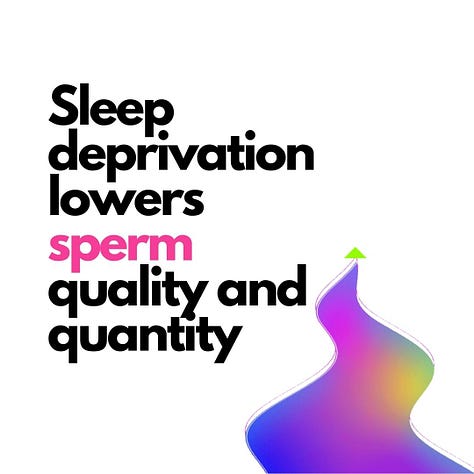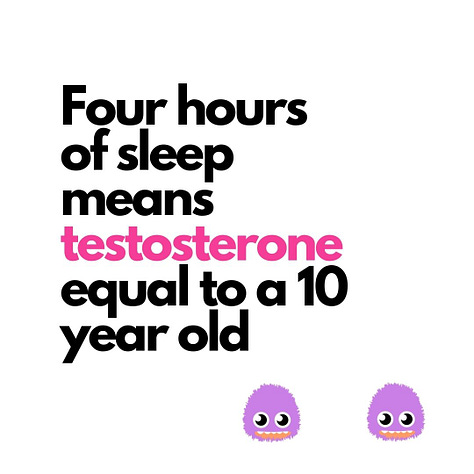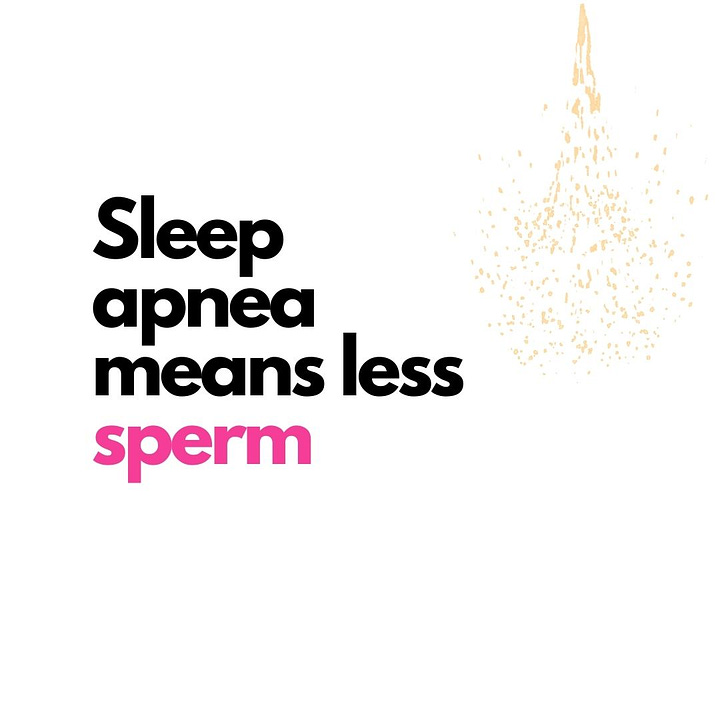Sexy Time is Circadian
1. Female sexuality is circadian
I am not a woman, so I don't know first-hand, but I understand menstrual cycle dysfunctions range from unpleasant to debilitating.
So anything that can improve it is more than valuable. Beyond all the pills, supplements, and wonder products, there is a simple help for the period: good circadian rhythm.
Every aspect of the menstrual cycle has a circadian component. Thus, anything less than optimum sleep will harm menstruation. Sleep deprivation might make it longer, more irregular, more painful, more erratic.
Sleep deprivation also severely impairs fertility. One study shows under 7 hours of sleep reduces the chance of getting pregnant by 15%.
Also who suffer from insomnia are 4 times more likely to have fertility issues. Night shift work presents a risk for miscarriage.
Also, you know how flight attendants and pilots are glamorous and live exciting lives? Well, that’s not quite true. Their circadian rhythms are messed up from all the flying from time zone to time zone and irregular schedules. Besides all the other negative effects, this also decreases their fertility. Flight attendants and pilots have more fertility issues than other people.
If all of that is not enough, disrupted sleep also means less sexual desire.
2. Male sexuality is circadian





There is a lot of talk about toxic masculinity. Beyond that, let's remember there is healthy masculinity, as in the health and fitness of male attributes in men.
Healthy masculinity is shrinking (pun intended). A review of scientific literature found that over the past 50 years, sperm counts have fallen by more than 50% around the globe. This decline is accelerating. Testosterone levels are also falling by about 1% per year. And muscular strength itself is decreasing.
Why are men becoming less manly?
There are many potential causes. One that is overlooked is sleep and circadian rhythm.
Sleep deprivation, e.g. sleeping too little or badly, has massive negative effects on manliness:
- Reduces testosterone, e.g. one week of 5 hours is as bad as aging 15 years
- Decreases physical strength and endurance
Real real men sleep better.
3. Circadian sex
Sexual desire is also circadian. Humans are always sexually active, unlike other mammals which have rutting seasons. However there is still a strong circadian component to our sexuality.
Testosterone doubles in the first hours of the day, e.g. early morning. Sexual desire in both men and women and virility of men is much higher upon waking in the morning because of the higher testosterone level.
Traditionally we have more intercourse in the evening and at night. This is not because of more desire, but for convenience. It’s at the end of the day when we are free from our tasks and chores and temptations, and thus have the time and disposition for intimacy. However, from a biological standpoint morning sex is better. But we need to make room for it in our modern lifestyle.
Also, if you are trying to conceive then go for morning sex, there is much higher chance of success then other times because of the circadian rhythm.
I guess this circadian feature means our ancestors enjoyed starting the day with ‘le petit mort’. The original affluent society indeed.
4. Seasonal sex
Statistically your birthday is in July, August or September.
Why is that? It means most babies are conceived October-December.
Is there anything special in Autumn for people to make more babies?
Yes and no. The clue to the answer is that deer, and many other mammals, also tend to conceive in Autumn.
What also happens in Autumn?
Days become shorter, and nights longer. As a result, our melatonin levels decrease. Melatonin is not a sleep hormone. It does not regulate sleep directly. What it does is track changes in light intensity from seasonal variations.
When there is less daylight, melatonin decreases. This has hormonal effects. In short it promotes sex drive. More intercourse leads to more pregnancies. Then 9 months later, to more babies.
When does daylight decrease and melatonin decreases with it? In October- December. Nine months later, in July-September the babies conceived in that Autumn are born.
Credit for data chart: user Plotset on Reddit r/dataisbeautiful
This shows our sexuality follows a circannual rhythm. This means that it is active to different degrees at different times of the year.
It is starkly evident in the variation of sperm counts. As can be seen in the graph, summer and September are the lows of sperm counts, but then it sharply increases in October-January. The increase is probably part of why most babies are conceived then.
Again, if you are trying to conceive, don’t despair if it’s Summer and it’s not working. Try again in October-December.
If you want to find out how well you sleep and how this affects your life, click here.
References:
Female sexuality and fertility:
https://pubmed.ncbi.nlm.nih.gov/32256630/
https://pubmed.ncbi.nlm.nih.gov/35772248/
https://www.ncbi.nlm.nih.gov/pmc/articles/PMC4402098/
https://www.sleep.org/articles/can-sleep-affect-conception/
https://www.ncbi.nlm.nih.gov/pmc/articles/PMC7101004/
Male sexuality:
https://www.dovepress.com/association-between-sleep-quality-and-semen-parameters-and-reproductiv-peer-reviewed-fulltext-article-NSS
https://www.ncbi.nlm.nih.gov/pmc/articles/PMC5402839/
https://www.sciencedirect.com/science/article/pii/S016041201933137X
https://pubmed.ncbi.nlm.nih.gov/32341784/
https://www.sciencedirect.com/science/article/abs/pii/S138994572100544X
https://www.ncbi.nlm.nih.gov/pmc/articles/PMC4445839/
https://www.strongerbyscience.com/research-spotlight-sleep-loss/
Circadian sex
https://pubmed.ncbi.nlm.nih.gov/496034/#:~:text=Peak%20levels%20are%20reached%20between,seem%20to%20have%20a%20plateau.
Seasonal sex
https://www.semanticscholar.org/paper/Circannual-rhythm-in-human-sperm-count-revealed-by-Tjoa-Smolensky/63279356b9e047650510fde06653bbaecd6e600a








